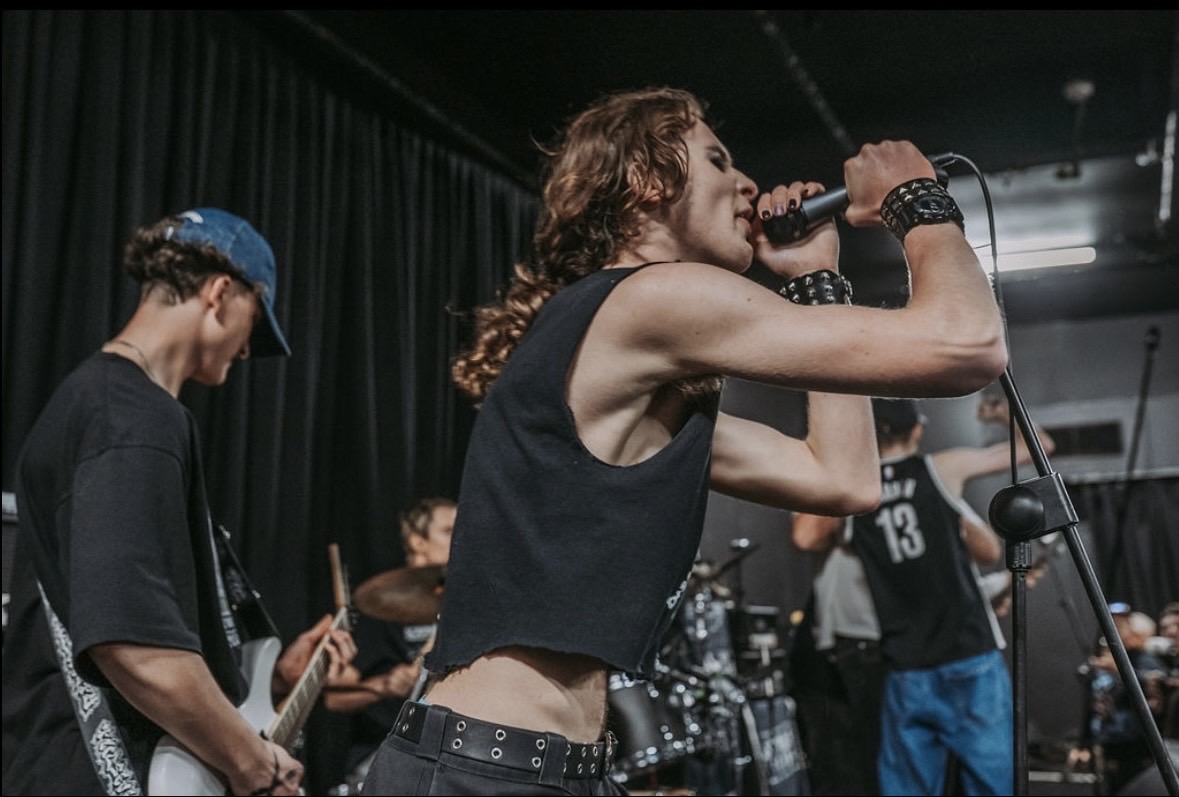I pull up outside the address — this must be the one. There is a new, bluish metal frame that is the skeleton of a new house, a concrete slab, and not much else. On our phone call the week before, Maggie Wilde West had told me they are rebuilding, so they are living in the painting studio out the back. I cautiously wander through to the back, seeing a builder checking the level of the fence: “Hi … is Maggie home?”
Wilde West has a presence that cannot be ignored, but also a no-nonsense demeanour accompanied by a tangible warmth. She is at home in her two-storey cottage-studio, nestled in a garden with an abundance of variety.
Early life in Sydney
Raised in New South Wales, Wilde West started her professional life as director working on school productions. At just 19 years old, she directed a production of Orpheus in the Underworld at a boy’s school in the 1970s.
Her production would go on to win multiple awards, earning her a tap on the shoulder from theatre director Richard Wherrett. Wherrett suggested Wilde West work in theatre professionally – an opportunity she had yet to explore: “I had wanted to work in theatre, but my mother wouldn’t hear it. When I was at school, she just said, ‘oh, that’s never going to happen’.”
In her early twenties, Wilde West joined the prestigious Ensemble Studios and trained with the likes of acclaimed actor Hayes Gordon. She started working in what she calls ‘front and centre theatre’ – lights down and curtain up at eight o’clock every night.
Moving West, the beginnings of community theatre
Wilde West has spent most of her life in Western Australia, despite spending her youth in Sydney. One might wonder why a working stage actor would relocate from Sydney to Perth, of all places.
“I wasn’t necessarily getting satisfaction. Sometimes I was, sometimes I wasn’t. I had recently divorced. So, you know, I was footloose and fancy free,” Wilde West says.
In reality, Wilde West was working multiple jobs and had just finished a three-month run of a show. When her boyfriend invited her to join him on a trip to Perth in his truck, she took it as a much-needed reprieve.
“So that’s how I was introduced to Perth. Came over the hill at Greenmount, saw the whole split and, well, I must admit, it was just on sunset. It was the most beautiful moment. And I went, I feel like I’m coming home.”
With a name like Wilde West, some might say her relocation was meant to be. We are sitting in her painting studio, surrounded by her paintings. They are quintessentially Western Australian: The Sturt’s desert peas, red rocks on red dirt, spinifex and paperbark trees. You can almost feel the summer heat radiating out of the frames. Wilde West has painted since her youth. She says her mother liked the idea painting of as a profession about as much as theatre.
Wilde West says Perth has an entrepreneurial spirit, and it is evident that she made the most of that very spirit in her time in the west. Her start in Perth was running classes in spaces on the campus which has since become Edith Cowan University’s WAAPA – Wilde West was part of the original WAAPA steering committee.
Voice Ensemble Voiceworks, VoiceworksPLUS, and later ventures
After 18 years as the director of Voice Ensemble Voiceworks, and 13 as the director of VoiceworksPLUS, Wilde West retired at the end of 2022 – the same year she was inducted into the WA Women’s Hall of Fame.
By that time, Wilde West had worked in performing arts for more than 55 years. The WA Women’s Hall of Fame credits her with producing and directing the first original theatre production in Australia for a cast consisting entirely of people with disability.
Wilde West’s impact on the performing arts in WA has been enormous. She was a founding member of DADAA, an organisation with the goal of “taking the stories and voices of people with disability to audiences and communities.” Wilde West also served as the director of VoiceworksPLUS for more than a decade – a group that fosters the talents of people living with intellectual disabilities.
According to the Australian Bureau of Statistics, more than 5 million Australians had a disability in 2022. According to Wilde West, this is more reason to have diverse spaces in theatre, and challenge what Wilde West refers to as the tired and elitist ‘star system.’
“Theatre is our mirror, and we can look at ourselves and go, oh, God, are we really like that?”
At heart, Wilde West is a storyteller – through theatre, through painting, and through her commitment to community. Although retired, Wilde West wants to keep working in theatre. Particularly, Wilde West says she’d like to continue working with vulnerable communities:
“What I’d really like to be working on at the moment is domestic violence. And I’d like to be working in refuges with those women and getting them to … I’m thinking about that. I really think there’s important things to do there, and theatre can do it.”



















